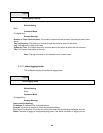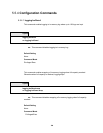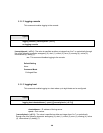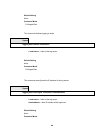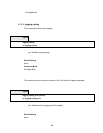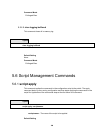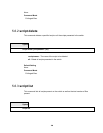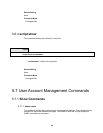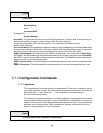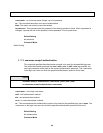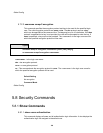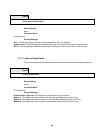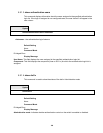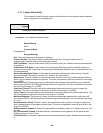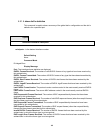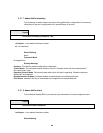
191
Syntax
show users
Default Setting
None
Command Mode
Privileged Exec
Display Message
User Name: The name the user will use to login using the serial port, Telnet or Web. A new user may be
added to the switch by entering a name in a blank entry. The user name may
be up to eight characters, and is not case sensitive. Two users are included as the factory
default, admin, and guest.
User Access Mode: Shows whether the operator is able to change parameters on the switch (Read/Write)
or is only able to view them (Read Only). As a factory default, admin has Read/Write access and guest has
Read Only access. There can only be one Read/Write user and up to five Read Only users.
SNMPv3 AccessMode: This field displays the SNMPv3 Access Mode. If the value is set to Read- Write,
the SNMPv3 user will be able to set and retrieve parameters on the system. If the value is set to ReadOnly,
the SNMPv3 user will only be able to retrieve parameter information. The SNMPv3 access mode may be
different from the CLI and Web access mode.
SNMPv3 Authentication: This field displays the authentication protocol to be used for the specified login
user.
SNMPv3 Encryption: This field displays the encryption protocol to be used for the specified login user.
5.7.2 Configuration Commands
5.7.2.1 username
This command adds a new user (account) if space permits. The account <username> can be
up to eight characters in length. The name may be comprised of alphanumeric characters as
well as the dash (‘-’) and underscore (‘_’). The <username> is not case-sensitive.
Six user names can be defined.
This command changes the password of an existing operator. User password should not be
more than eight characters in length. If a user is authorized for authentication or encryption is
enabled, the password must be eight alphanumeric characters in length. The username and
password are not case-sensitive. When a password is changed, a prompt will ask for the
operator’s former password. If none, press enter.
Syntax
username <username> {password | nopassword}



